Wikipedia:Wikipedia Signpost/2011-09-12/WikiProject report
Politics in the Pacific: WikiProject Australian Politics

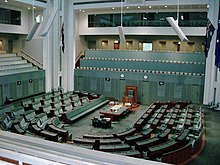


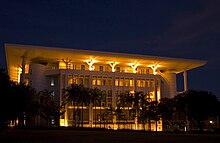
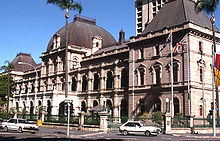


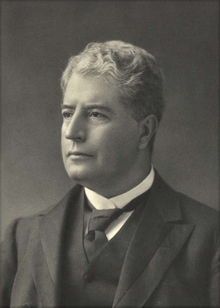
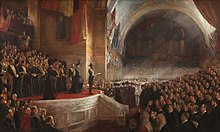
This week, we spent some time with WikiProject Australian Politics. Started in May 2005, the project has built up a collection of over 8,000 pages, including 12 pieces of featured content and 17 Good and A-class Articles. Like many topics related to Australia, WikiProject Australian Politics is supported by a parameter of WikiProject Australia's unified banner template. The project is also related to WikiProject Australian Law and WikiProject Australian History. We interviewed seven of the project's members.
Pete (Skyring) is from Canberra, home to the parliament of Australia. While not as active as he once was, he still keeps an eye on political subjects because "living in the national capital, federal politics is as present as the weather to me." He deplores biased coverage of political parties and politicians, including editors wrangling over trivial information like former Prime Minister Kevin Rudd eating his own earwax.
Orderinchaos joined in 2006 when he noticed massive gaps in the coverage of several states as well as at the federal level. He admits "there's still a *long* way to go, but a lot of the foundations are there now." He thinks this project differs from others he's worked on because "it's more like a meeting space than a workgroup – several of us are or have been very very active in one area and we use the space to ask questions, raise issues or ideas, or bring anomalies to a wider audience."
Roisterer describes himself as "an Adelaide lad" but he was working as a journalist in New Zealand when he first joined Wikipedia in 2004. He studied Australian politics at university "so it was logical to work on politics articles (although I tend to stick to long-dead politicians to lessen the danger of getting embroiled in disputes)."
When Frickeg joined in early 2007, he was upset by gaps in coverage of federal politics, particularly the large number of redlinks for politicians. He's focused considerably on politics at the federal level and in New South Wales.
Canley has always been interested in politics in general and Australian politics in particular "so it was pretty much inevitable I would gravitate to this project." He sees additional challenges in improving Australian topics because "we don't have the luxury of public domain government works and images, so there's a lot more work to do to get decent articles and photos going." Despite the challenges, he enjoys doing research, "whether it's popping into the library or delving into online references such as Trove and Picture Australia, government gazettes or election and parliamentary data." He agree with Pete that "there is a tendency towards trivia and recentism, but that's pretty much the case everywhere."
Satu (SatuSuro) feels that the "ground level Local Government politics in Australia" are not covered well by both the Australian mainstream media and by Wikipedia. Because "most editors appear to be interested in the big picture, national level" he hopes to elaborate on "the forces and the issues in political activity at local government" and the many regional issues that tend to be under-reported.
Nick-D is from Canberra and began contributing to Wikipedia in November 2005. He is also an active member of WikiProject Military History and many of the Featured and Good Articles he helped build are related to the Australian military.
The last time the WikiProject Report featured a project covering Australia was in 2007 and many Australian projects are semi-active or inactive. Do you feel that Australia is under-represented on the English Wikipedia? What are some difficulties faced by Australian WikiProjects?
- Nick-D: I think that Australia is adequately represented, though many articles are under-developed compared to the equivalent articles on other countries.
- Orderinchaos: The Australian projects have seen a drop in activity in 2009 commensurate with the rest of the project generally – one of our earlier strengths was that we had a strong group of collaborative, experienced editors, but many of these are now either inactive or less active (including myself in the latter category) due to work or study commitments offline which may not have been as big an issue when we started editing. Australia is adequately represented – last I checked, we represent around 3% of all content on enwp, which has been fairly steady throughout Wikipedia's growth. AUSPOL, for the record, has suffered less than some of the other subprojects – we still have an active community, albeit small, and regular use of our talk page.
- Roisterer: Unfortunately we have lost a number of very knowledgable editors over the past few years which has slowed the momentum of the project, and, like Orderinchaos notes, many of us remaining aren't as active as we'd like due to work commitments. However, we're slowly making progress.
- Frickeg: The project has certainly slowed down recently, but this is perhaps more a consequence of us having worked out many of the issues that used to take up so much time. As Roisterer said we've lost some valuable editors over the years and many of us are semi-inactive; we certainly have a very small base of editors who contribute regularly. I don't feel we're particularly under-represented, though, thanks to a generally high calibre of contributions by that small base.
- Satu: Australian sub-projects had a high point some three to four years ago, and the decline in activity has been evident more in the last two years with some projects literally at a standstill. Some projects can be said to have been developed sufficiently to survive periods of inactivity – it is possible that other projects are not as lucky as the politics project which due to he state of Australian federal and state politics – new and recycled issues require attention more than some subjects in other projects – probably eliciting interest in editing to keep up with the issues.
Australia's political system shares similarities with Britain's Westminster parliamentary system and the federal system of the United States. Has there been any sharing of information, templates, or expertise with WikiProjects or individual editors from outside Australia?
- Frickeg: Not really – the Australian system is different enough from both Britain and the US that it's been better to do our own thing in general. In particular our use of preferential voting has forced us to develop (or at least modify) many templates for ourselves. Having said that there have been some outstanding contributions to the area by non-Australian editors, like User:Wehwalt's excellent work bringing Gough Whitlam to FA.
Did WikiProject Australian Politics undertake any special initiatives during the 2010 federal election? Is there work still to be done updating articles after the election? Are there any steps being taken to prepare for the next election?
- Orderinchaos: Not in particular – there was a spike of activity but no different practices followed. Sometimes elections serve as springboards for drives by individuals to fill holes or develop new structures – User:Frickeg created a series of electoral results articles for every division in Australia (e.g. this one) in the leadup to both the 2007 and 2010 elections. The 2008 election brought our attention to the fact some electorate articles were in a poor state and we went on a drive to replace their content – one Good Article emerged from the process, and all WA electorate articles are functionally complete. A redistribution means we'll probably need another one ahead of the 2013 state election.
- Frickeg: Constant vigilance is generally needed around election time, when like all politics-related projects there tends to be an invasion of partisan editing. Apart from maintaining the election page and endeavouring to keep all articles up to date there was no formal initiative during the campaign. There are probably a few of the dustier articles that may have missed an update, but most of them are up to date for the election, if not exactly complete. The next election is (probably) a long way away so there's little to prepare for at this stage other than to continue to update for current events, although our previous elections have served to prepare us quite well.
The project is home to 12 Featured Articles and Lists, 15 Good and A-class Articles, and a variety of Featured Pictures. Have you contributed to any of these articles or images? What are some challenges of bringing Australia-related content to featured status?
- Orderinchaos: I've personally written two of the good articles (Electoral district of Perth and Port Macquarie-Hastings Council dismissal, 2008). One big challenge about Australian topics – I assume this would not be specific to Australia – is that so much is not online. Anything on WA for example requires solid library research, it's simply not possible to put stuff together from what is available online. Over the years I've built a reasonable home library of reference texts, as well as a good understanding of the university and state libraries. Another related problem is that the offline information may only be present in one location, and the person with the background to research it may be in another – scanning takes time and can produce files too large to email, so we sometimes resort to the postal system to exchange information. I've made open offers to help anyone looking for sources, and I know other editors have done the same in other states.
- Frickeg: I've recently shifted focus to trying to improve some of our content to recognised status, after the exhausting job of creating individual electorate results pages for every electorate. So far I've written three Good Articles: Albert Gould, John Neild and Edward Millen. As Orderinchaos said finding sufficient sources, even on fairly basic things, can be a challenge. I'd also add that the fact that official portraits of Australian politicians are not available for us to use is difficult when it comes to modern politicians; the best recourse for getting photos is generally for editors to attend an event at which the politician is speaking and request a photo personally.
- Roisterer: My impact has been fairly small; I brought Wilfrid Kent-Hughes to GA some time ago and started Thomas Playford IV, which was then greatly improved upon to become an FA. Like other editors, I've had plans to build other articles up to GA/FA levels but life seems to get in the way.
- Canley: My focus has been on the list-type articles (Members of Parliament for XXXX–YYYY) and statistics such as election results, as well as obscure biographies which are harder to fill out to a high quality, so I haven't really been involved in improving the prose quality of articles. I'm going for quantity over quality, basically!
What are the project's most pressing needs? How can Wikipedians living inside and outside Australia help the project's efforts?
- Orderinchaos: The main thing we need is more people. We have most of the sources we need to develop more content but haven't, between us, the time to do it. Our experience with newer editors who want to write about politicians who've historically represented their own area, or who went to their former school, or whatever, has been good. Another pressing need is photographs of politicians – we would love to be able to illustrate articles, but the dogged enforcers of fair use policies have led to many images, rightly or wrongly depending on the case, being deleted and in some cases (Joh Bjelke-Petersen – premier of QLD 1968–1987 – and Gough Whitlam – prime minister of Australia 1972–1975), photos are taken from well before their peak notability in public life simply because those photos are pre-1954 and therefore free. Only a handful of politicians have been willing to donate photos under a free licence – it would be good to either have a US-style setup where government-produced artefacts are in the public domain, or even just an agreement from either parliaments or state/federal political parties to licence one photo of each parliamentarian.
- Pete: Wikipedia's policies on co-operation and conflict need to be more scrupulously observed here, to encourage new editors to stay and contribute, rather than being chased away by the old bulls defending their territory... Case in point: in 2010 the then Prime Minister Kevin Rudd was toppled by his hitherto loyal deputy Julia Gillard... According to our article, he had merely "stepped aside, after announcing a leadership ballot." There was no mention of why on earth a sitting Prime Minister would do this, even though the Australian media had chronicled his disasters and downfall for months previously... Our articles should not reflect hype and scaremongering, but neither should they give a false impression.
- Nick-D: I agree with all the points Orderinchaos raises, and especially the one about there being a shortage of active editors. Due to the large number of articles which fall under the project's scope and the fact that many of them are BLPs, a lot of the active editors' time is tied down with maintenance and reverting vandalism and/or POV-pushing. On the topic of POV pushing, it is a problem at times, and especially in the lead up to elections (and I think that people from both sides of politics are equally at fault here – and by this I'm not talking about the regular editors). I've personally seen a number of articles about Australian politicians which were obviously written by their staff, and the situation got quite problematic for a while in the lead up to the New South Wales state election, 2011.
- Frickeg: Again, I agree with the points above. We are suffering something of a dearth of active editors at the moment (I know I'm not nearly as active as I used to be, for various reasons), which is leaving many things undone. At the moment there aren't really enough editors to patrol recent changes in our many BLPs, let alone other pages. The POV-pushing thing is still a problem and likely always will be, although it seems to have died down somewhat recently (I noticed far less during the 2010 election than there was in 2007, although New South Wales state politics is something of an exception in this regard). I suspect many of our articles are written from a somewhat insular perspective and could probably benefit from non-Australian eyes to clarify some aspects.
- Canley: I would like to see more sources of information and imagery available online, and under free or copyleft terms rather than Crown copyright or non-commercial use. There is some move towards CC licences for government information in Australia which is great, but we're very much constrained by onerous licence terms on things like electoral boundary data and politician's profile photos. It really varies from state-to-state the level of online or even archived data available to the public, from biographical databases to election results, some is behind paywalls as well, although I'm one of the lucky ones who has a university account through which I can access a lot of journal material. I would really like to see Wikimedia Australia and the Australian government co-operate in getting historical data and information out to a wider audience. As others say, there's plenty of information to keep us working for years, but not enough active editors.
- Satu: Following on from Canley's comments; the relative disinterest, antipathy and inactivity on the part of some Australian states and some Federal government departments needs to be reversed – specially when seeing how wikipedia friendly Trove is. Also as he says it (the project, the subject) requires active editors.
Anything else you'd like to add?
- Roisterer: The Australian political system has had a number of firsts: We were the first to introduce the Secret ballot, the first parliamentary socialist government in the world (at both state and federal level) and in 1861 women in South Australia were voting in local elections. Anyone who gets involved in the project will likely find all sorts of other tidbits.
Next week, we'll find a better excuse than "my dog ate it." Until then, visit the library's secret archive while you're cutting class.


Discuss this story
Well, thanks for the shout out. I should add that the Whitlam and 1975 Australian constitutional crisis articles would not be as good as perhaps they are if Australian editors hadn't been willing to help out on the fine points of OZspeak. I have no Australian projects currently planned, but I'll be back in Oz in February and will hit the bookshops. There's a fine one in Brisbane I favour.--Wehwalt (talk) 01:57, 15 September 2011 (UTC)[reply]
I wonder if anyone has considered trying to get photos of current politicians by waiting on the steps of parliament house? Or even writing to the MP's offices? Stevage 06:26, 19 September 2011 (UTC)[reply]